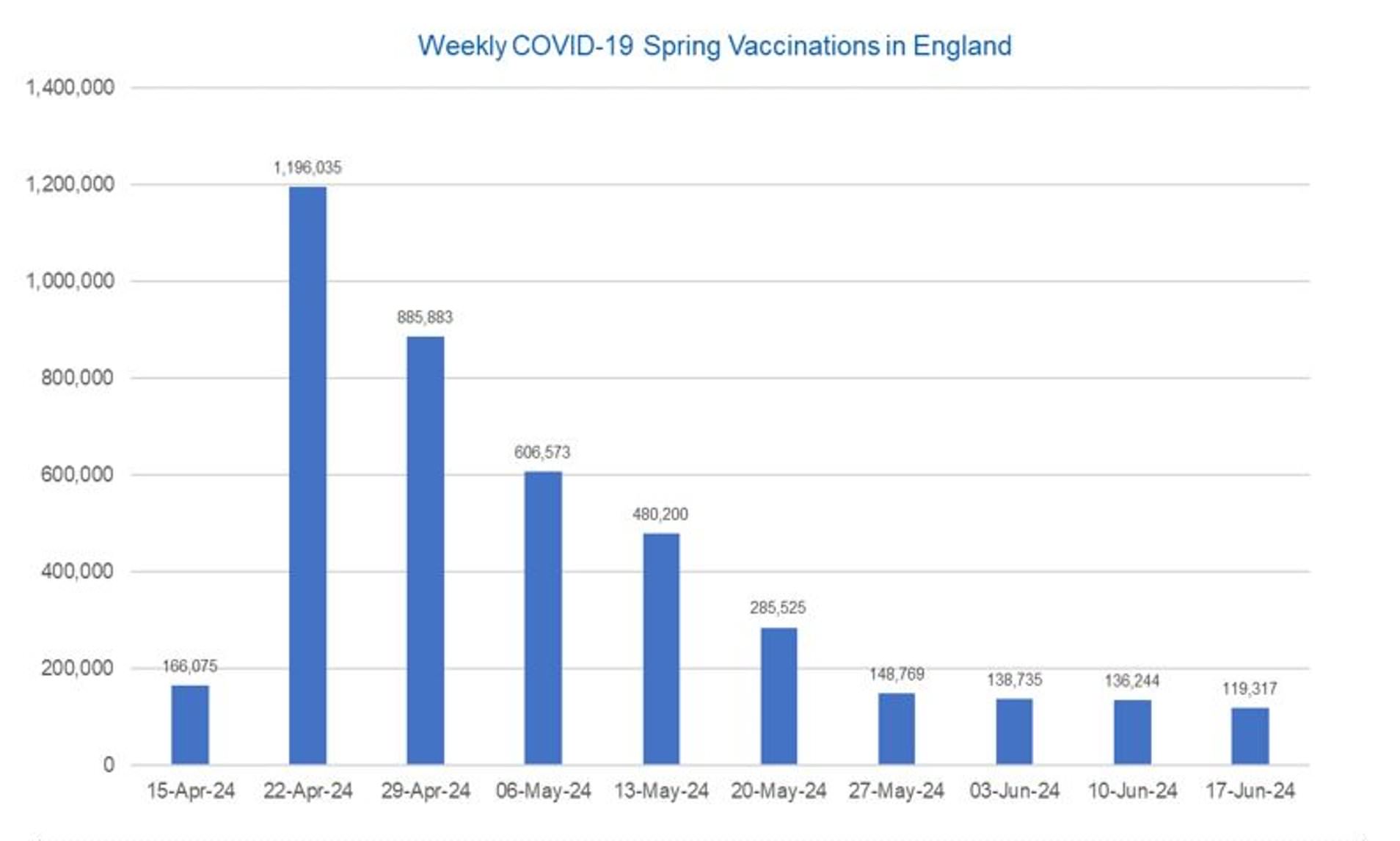
COVID WAVE FEARED AS FLIRT VARIANTS SPREAD AND VACCINE DRIVE FALTERS
Football fans gathering to watch the Euros this year could be behind the 'building' summer Covid wave as new FLiRT variant spreads amid the vaccine drive faltering.
An infectious disease expert and former government adviser on Covid-19 suggested that the high number of cases is coinciding with the football championship, as it did in 2021.
Prof Mark Woolhouse told The Telegraph: 'There is a widespread impression of a growing 2024 summer wave, much as we saw in 2021 when there was also a Euros football tournament, and evidence that this contributed significantly to the spread of infection.'
Hospitals saw the number of cases of the virus rise by a quarter in a week due to the more aggressive strains, also known as KP.2 and KP.3, which have already caused a significant spike in cases in the US.
It comes as only 4.1million of the 7million vulnerable people eligible for a spring booster jab have taken up the offer, meaning 40 per cent won't have the extra protection.
Experts also fear current vaccines are less effective FLiRT variants, which have evolved to become more contagious and to evade antibodies.
Dr Matthew Binnicker, of the Clinical Virology Laboratory at Mayo Clinic in the US, said this was due to the spike protein, the part of the Covid virus vaccines are designed to target, changing significantly.
'This variant can evade the immune response more effectively than prior versions of the virus,' he said.
'If you've been infected, or you've been vaccinated, and you've got some antibodies in your system, those antibodies may not recognise the protein on the surface of the virus as well.'
Dr Binnicker added those who were last vaccinated more than six months ago will have fading immunity and are more likely to suffer symptoms if they catch Covid.
NHS statistics show the number of people going into hospital with Covid went up to 3.31 per 100,000 in the week to 16 June, compared with 2.67 per 100,000 in the previous week.
Those aged 85 and over were largest group of people hospitalised with the virus.
It has become difficult to know how many people nationally have had the virus, as most routine testing has been phased out since the pandemic.
Most of the data that is recorded today comes from laboratory tests, mostly swabs taken from people in the healthcare system.
This shows there were 4.37 cases of Covid per 100,000 people admitted to hospital in England on 26 June — around one in 25,000 of the people who went in that day.
Professor Paul Hunter, a renowned infectious diseases expert from the University of East Anglia, pointed out it is a tiny proportion compared with the height of the pandemic.
He told the BBC people should not be concerned by the current Covid rates.
'I think we're probably seeing about as much infection this year as we were seeing last year,' he said.
'We are all of us going to get repeated Covid infections from birth through to death.
'Generally what we've seen is that over the last three to four years is the severity of illness associated with Covid has gone down a lot.
'Ultimately, it's going to become another cause of the common cold and, for many people, that's what it is now.'
He added: 'To be honest, you can't really avoid it because it's so common.'
FLiRT Covid variants are all descendants of Omicron that became dominant in the UK towards the end 2021 and start of 2022.
All appear to have picked up the same set of mutations on the spike protein, which the virus uses to attach to humans and take hold.
Some of these mutations make it easier for the virus to infect the nose and throat compared to other circulating variants.
UKHSA epidemiologist Dr Jamie Lopez Bernal said: 'If you are showing symptoms of Covid or flu, help protect others by staying at home and avoiding contact with other people, especially those who are more vulnerable.'
Speaking about the recent surge in cases, Professor Steve Griffin an expert of medicine at Leeds University said: 'This is clearly early days, but it certainly looks as though yet another Covid wave is building.
'If the rise in hospitalisations continues, this is obviously worrying. Although we've just had a spring booster campaign for vulnerable populations, the uptake was lower than in 2023, and there is a considerable difference between the current vaccines and circulating viruses.'
Read more 2024-07-02T08:10:32Z dg43tfdfdgfd